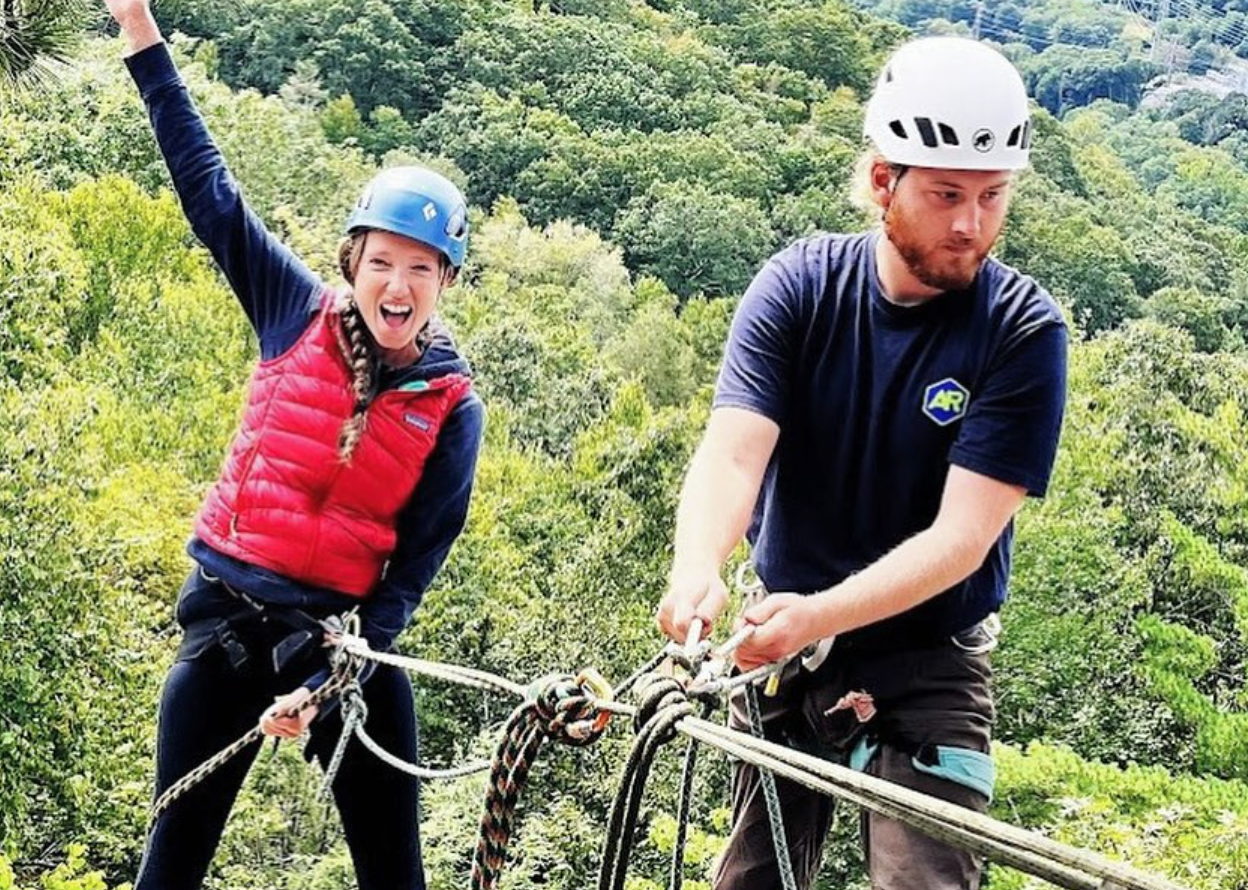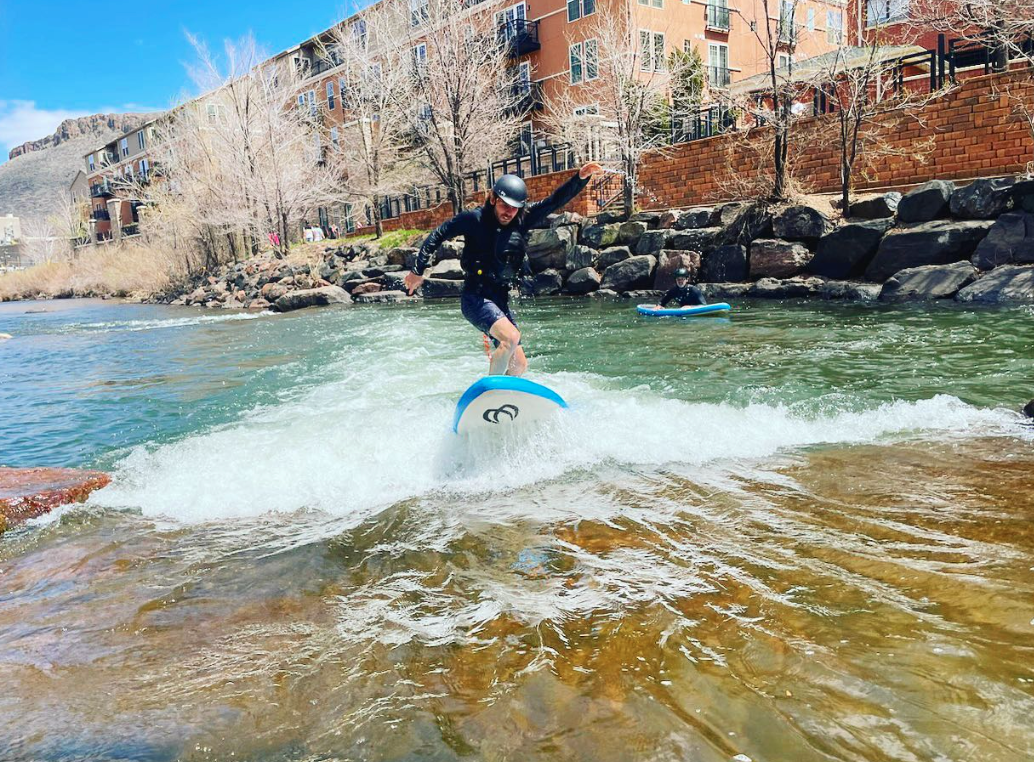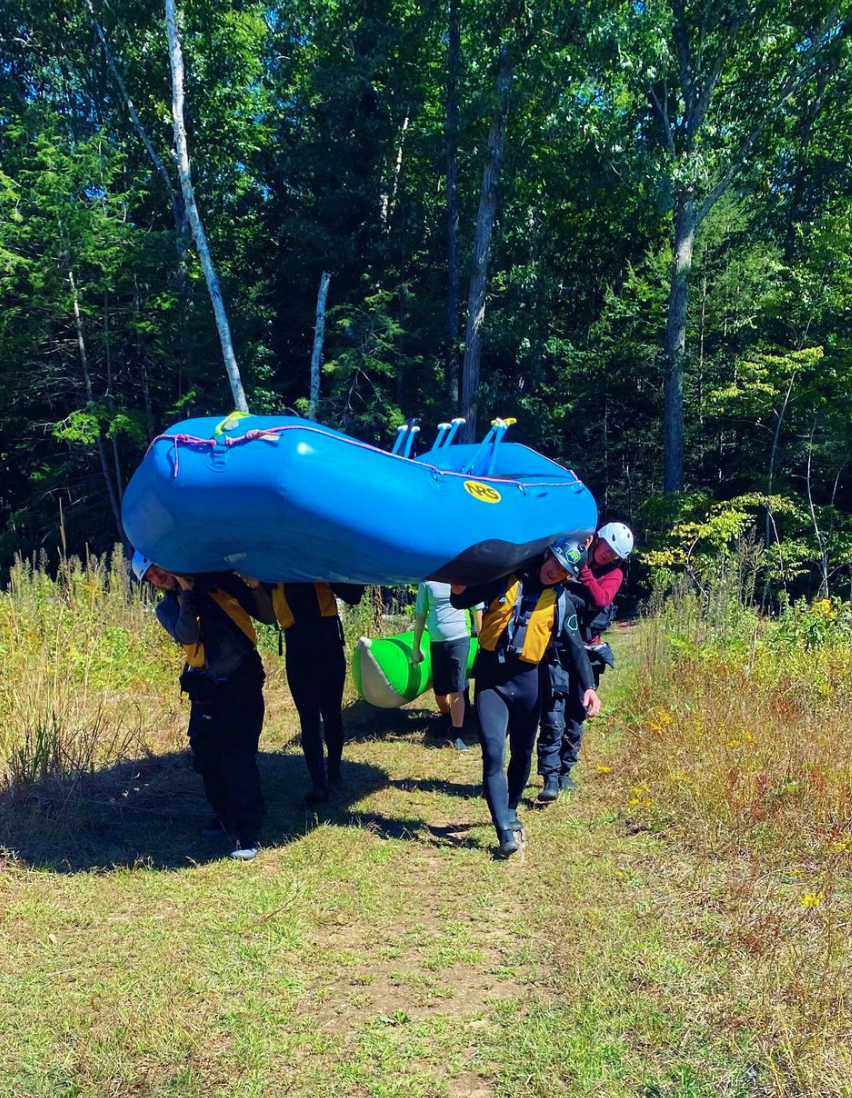Why Adventure Works
Consistent time outdoors can change our lives. Intentional time in nature allows us to tap into healing and well-being in a few different ways. We connect with ourselves and others, we unplug and re-set, and tune in to what’s happening on a profound level, internally and externally. The senses take over and the thinking mind quiets.
On a basic level, many activities outside are simply fun, so we get the chance to get to enjoy ourselves. This is simple, but a vital, and often underrated, part of our overall wellness. What’s more, we face ourselves directly as we explore our skills and capacity, set and achieve goals, and connect with the part of ourselves that harmonizes to a more universal tune.
AR Guides, Collin Salmon and Kate McGrady, enjoying the rocks
On a higher level, experiences in nature help us to take space from the day-to-day experience and achieve a bird’s-eye-view where we can reflect and determine what shifts we may wish to make in thinking and behavior. We confront ourselves and our gifts and limitations in real time. As we immerse in movement and breathe fresh air, we may see things from different points of view. This is the gift of perspective. Outside, we connect quickly, both within and with our environment—it’s part of the process when we land in the present and create space for the internal and external wilderness to align.
“The path I'm on has opened my heart to the opportunity of helping others by spending time outdoors. Whether it's overcoming fears (rock climbing) or learning how to stay calm (everything), or applying how to interpret necessary information (such as navigating the river), the lessons learned in natural spaces constantly inform daily life. Time in nature just works.”—Collin Salmon, AR Guide
Adventure fosters connection—to the skills used outside, to others, and to individual capacity. When we engage in activities, such as hiking, surfing, camping, skiing, climbing, fire ceremony, and on, the powerful lessons of the natural world create a context for inspiration and transformation. Perhaps even more poignantly, our tangible awareness of what matters—of what’s important—shifts in the here and now.
AR National Field Director, Nate Bennick, river surfing
The Science of Why We Go
The psychological and physiological benefits of guided, skillful experiences outdoors is scientifically grounded. The research reveals many ways outside adventures can benefit our well-being. These are evidence-based practices.
One study finds that time in nature can increase feelings of happiness and decrease symptoms of depression and anxiety. We know, from our own personal experiences, that time in nature makes us feel good. The scientists agree that access to natural, green spaces is a vital component of our health. Simply viewing images of natural spaces can have an impact on our state of mind; that’s how powerful it is.
Further, studies reveal that nature has a positive impact on mental health outcomes, including improving cognitive functioning, decreased stress responses, and a marked increase in memory. These are direct results of intentional time spent in natural spaces. Engaging in adventure adds more layers to the benefits.
AR Crew heading out for whitewater rafting
When it comes to outdoor coaching and guiding couched in mental health awareness, there are basics to how it’s done. The idea is to learn how to build awareness and spend time outside mindfully. In addition, there are technical tools to practice and real-life skills to apply.
As we explore the power of observation, we learn how to read the environment, knowing how to choose approaches appropriate to the activity. Along the way, through exploration, we evolve and develop self-esteem, confidence, and trust. Consistent commitment reifies these core components to one’s identity. These skills are lifelong and empowering.
Why Adventure Works
As screens, tech, and sedentary practices dominate, the resources to attend to our health, are more crucial than ever. The ways in which we care for ourselves, spend our time, and structure our days is of vital importance.
Outdoor endeavors bring us into our bodies as we face and overcome challenges, expanding our sense of self each step of the way. This builds resilience, strength, and agency as we define and redefine our capacities. What’s more, this improves outcomes related to mental health and physical wellness.
Nature is a powerful backdrop to establish positive patterns to manage our state of mind and promote healthy living.
Adventure and Connection: Positive Outcomes
When we venture outside, in structured ways, we see the results. To start, simply the support of another person means relationships are forged by building trust and camaraderie. Relationships are an indicator of long-term health. Studies find that the mentorship connection generates positive outcomes, both for the mentee and mentor. When it comes to adventure, the dynamic is symbiotic—both people benefit and hold each other accountable. There is no traditional hierarchy of wisdom; it comes from both parties in different ways. Each activity brings new teachings.
The research reveals that relationships have a significant impact on public health. In particular, this study finds that connectedness is one of the strongest markers for general psychological health. In another research summary, social connection is a key component of mental health as we age, and will become a major factor in global health as the population advances. Projections show that by 2050, approximately one fifth of the population will be over the age of 65. Hence, learning how to practice healthy habits now establishes lifelong behavioural patterns. We are social by nature; these findings make sense.
Ancestral Wisdom
There is something very real about the fact that while our current lived experience in society happens in a “natural setting”, the foundation of our species is one of a far greater connection with the earth. The connection to nature, the elements, wisdom practices, and ancestral tools are traditional modes of experience that transcend the day.
When the day winds down, we set camp, harvest wood, build a fire, and cook a meal. We move with the rhythms. Our internal compass can reset, unfettered by external influences or intentions. The focus becomes the here and now. We can savor the moment, in the present. Studies show that the capacity for this type of presence and reverence in real time is beneficial for one’s state of mind. It makes us feel good, period. The ability to be present connects us with a deeper wisdom and this is compounded when experienced in nature. Outside, we tap into something inherent and immeasurable—timeless. Belonging. Interconnectedness. For those of us struggling with screens, alcohol, substance use, or any type of addiction, this is powerful. The mind can tend to get stuck in the shadows, but adventure pulls us out and guides us to feel OK in who we are and where we’re going. This is healing.
AR Crew and clients by the campfire
Learning to be comfortable in our own skin, without escaping the present with alcohol, drugs, or any other form of maladaptive coping mechanism, is what it’s all about. This is our shared experience, generational trauma that we are evolving from. There are clear-cut skills for this evolution, and they span from self-awareness, self-care, self-regulation, and self-love, to esteem, confidence, and goal achievement. It’s a journey that we’re all navigating, together. And time outside brings it all into focus.
Photos from Adventure Recovery team members
Hero image courtesy of unsplash





